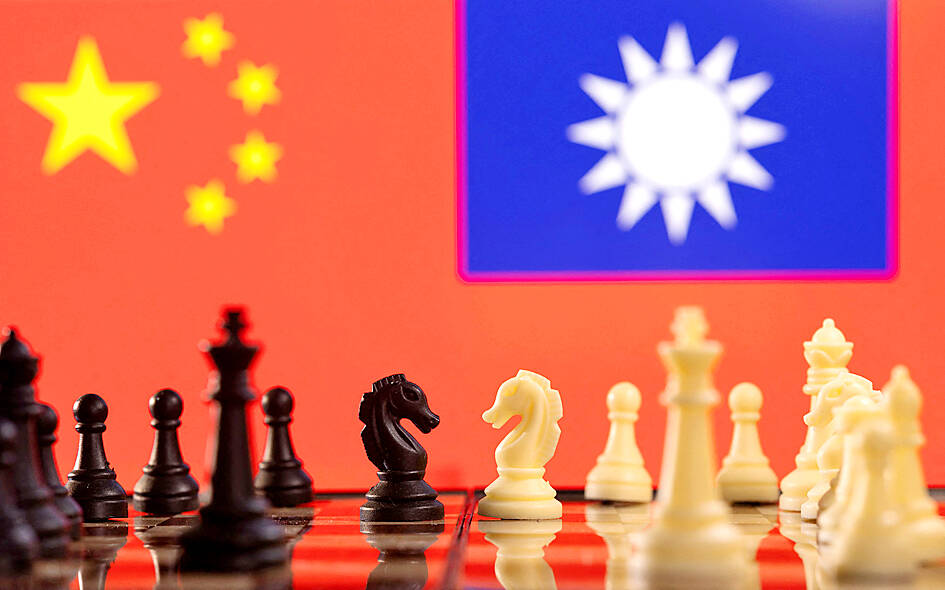Democratic Progressive Party (DPP) Legislator Puma Shen (沈伯洋) and other lawmakers have proposed amendments to the Criminal Code defining four crimes of collusion with foreign powers.
As collusion, which is currently not well-defined under the law, carries a severe penalty, judges tend not to invoke it, Shen said.
After consulting with the National Security Bureau, he and other DPP members have proposed defining four types of criminal behavior that would fall under the category of collusion.

Photo: Reuters
They are publicly declaring or recognizing the right of a foreign power to exercise rule over the Republic of China (ROC); failing to perform one’s official duties as a civil servant of the ROC or committing acts that contravene those duties at the request of a foreign power; assisting a foreign power in attempting to exercise authority over the sovereign territory of the ROC; and endorsing the claims of a foreign power of sovereignty over the territory of the ROC, whether through participation in meetings, signing of petitions or other means.
The draft also sets out hierarchical penalties for different targets, mainly civil servants.
Highest in the hierarchy is the president and vice president, followed by elected public officials; heads and deputy heads of agencies; high-ranking members of the Executive Yuan; justices, examination committee members and members of supervisory committees; and diplomats.
The hierarchy also includes noncommissioned officers and other military personnel, heads of political parties, police officers, Coast Guard Administration personnel, customs officers, firefighters, civil defense committee members, and those in charge of the operations of critical infrastructure, among others.
Civil servants found guilty of collusion could receive up to life imprisonment, while non-public servants would face fixed prison terms of one to seven years, Shen said.
Not all actions perceived as “united front” activity would be punishable under the amendment, he said.
“There are many artists in Taiwan this year who have made pro-China statements, but those artists operate in a free market after all, and it is their personal freedom to pursue opportunities in China,” he said.
However, professors or government officials making such statements are at higher risk of facing legal consequences, he said.
Lawmakers are concerned that current laws encompass a gray area, which China would take advantage of, he said, adding that further revisions would be likely.
Separately, DPP Legislator Chiu Chih-wei (邱志偉) has proposed an amendment to Article 8 of the Anti-Infiltration Act (反滲透法), which would call for the Constitutional Court to rule on the dissolution of a political party in the event that the party or its key members commit acts that contravene the Constitution, disrupt social order or affect national security.

The Central Election Commission has amended election and recall regulations to require elected office candidates to provide proof that they have no Chinese citizenship, a Cabinet report said. The commission on Oct. 29 last year revised the Measures for the Permission of Family-based Residence, Long-term Residence and Settlement of People from the Mainland Area in the Taiwan Area (大陸地區人民在台灣地區依親居留長期居留或定居許可辦法), the Executive Yuan said in a report it submitted to the legislature for review. The revision requires Chinese citizens applying for permanent residency to submit notarial documents showing that they have lost their Chinese household record and have renounced — or have never

A magnitude 5.6 earthquake struck off the coast of Yilan County at 12:37pm today, with clear shaking felt across much of northern Taiwan. There were no immediate reports of damage. The epicenter of the quake was 16.9km east-southeast of Yilan County Hall offshore at a depth of 66.8km, Central Weather Administration (CWA) data showed. The maximum intensity registered at a 4 in Yilan County’s Nanao Township (南澳) on Taiwan’s seven-tier scale. Other parts of Yilan, as well as certain areas of Hualien County, Taipei, New Taipei City, Taoyuan, Hsinchu County, Taichung and Miaoli County, recorded intensities of 3. Residents of Yilan County and Taipei received

Taiwan has secured another breakthrough in fruit exports, with jujubes, dragon fruit and lychees approved for shipment to the EU, the Ministry of Agriculture said yesterday. The Animal and Plant Health Inspection Agency on Thursday received formal notification of the approval from the EU, the ministry said, adding that the decision was expected to expand Taiwanese fruit producers’ access to high-end European markets. Taiwan exported 126 tonnes of lychees last year, valued at US$1.48 million, with Japan accounting for 102 tonnes. Other export destinations included New Zealand, Hong Kong, the US and Australia, ministry data showed. Jujube exports totaled 103 tonnes, valued at

BIG SPENDERS: Foreign investors bought the most Taiwan equities since 2005, signaling confidence that an AI boom would continue to benefit chipmakers Taiwan Semiconductor Manufacturing Co’s (TSMC, 台積電) market capitalization swelled to US$2 trillion for the first time following a 4.25 percent rally in its American depositary receipts (ADR) overnight, putting the world’s biggest contract chipmaker sixth on the list of the world’s biggest companies by market capitalization, just behind Amazon.com Inc. The site CompaniesMarketcap.com ranked TSMC ahead of Saudi Aramco and Meta Platforms Inc. The Taiwanese company’s ADRs on Tuesday surged to US$385.75 on the New York Stock Exchange, as strong demand for artificial intelligence (AI) applications led to chip supply constraints and boost revenue growth to record-breaking levels. Each TSMC ADR represents